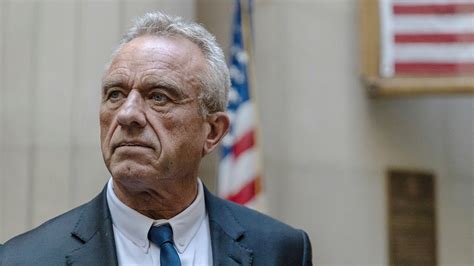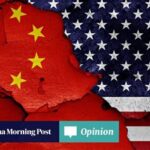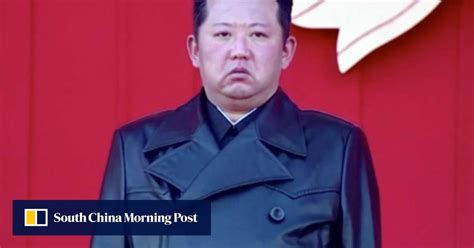
Robert F. Kennedy Jr.’s revamped Children’s Health Defense (CHD) “science and regulatory affairs” team, intended to bolster the organization’s credibility on vaccine science, is facing turmoil after the early resignation of its director, Dr. Brian Hooker, and subsequent departures of multiple members. This upheaval raises further questions about the scientific rigor and direction of the anti-vaccine group.
The exodus began shortly after the team’s formation, with Hooker’s abrupt departure attributed to internal disagreements over strategy and the handling of scientific data, as reported by individuals familiar with the matter. His resignation has reportedly triggered a ripple effect, leading to the departure of several other scientists and researchers who shared similar concerns about the direction of the team and its ability to conduct unbiased research.
“Brian Hooker is no longer with Children’s Health Defense,” confirmed a CHD spokesperson, declining to comment further on the circumstances surrounding his departure or the subsequent resignations. Hooker, a prominent figure in the anti-vaccine movement, previously served as CHD’s chief science officer and has been a vocal critic of vaccine safety and efficacy.
The departures present a significant setback for Kennedy, who has sought to position CHD as a credible voice challenging mainstream scientific consensus on vaccines and other public health issues. The loss of key personnel raises questions about the organization’s capacity to produce reliable scientific analysis and its overall influence in shaping public discourse on vaccine policy.
The internal discord within CHD highlights the ongoing debate surrounding vaccine safety and the challenges faced by organizations that promote views outside of established scientific understanding. Critics argue that CHD’s claims are based on flawed research and misinformation, posing a risk to public health by discouraging vaccination.
The shake-up within CHD’s scientific team underscores the importance of critically evaluating the information presented by advocacy groups and relying on credible scientific sources when making decisions about personal health and public health policy.
The departures also put more focus on RFK Jr.’s role and direction within the organization, and what impact the turnover may have on its future viability and credibility. The turnover raises pertinent questions about the ability of CHD to attract and retain qualified researchers, given the controversial nature of its work and the widespread criticism it has faced from the scientific community.
The controversy also casts a spotlight on the broader issue of scientific integrity and the role of experts in public health debates. It reinforces the need for transparency, rigorous methodology, and independent verification of research findings, particularly when dealing with sensitive topics that have significant implications for public health.
Further analysis is required to fully understand the long-term implications of these departures on CHD’s operations and its ability to influence public opinion on vaccines. However, the immediate impact is clear: the organization has suffered a significant blow to its credibility, and its future direction remains uncertain.
Background on Children’s Health Defense and Robert F. Kennedy Jr.
Children’s Health Defense, formerly known as World Mercury Project, is an anti-vaccine advocacy group founded by Robert F. Kennedy Jr. The organization has consistently promoted misinformation about vaccines, claiming they cause autism and other health problems, despite overwhelming scientific evidence to the contrary. Kennedy, a lawyer and environmental activist, has become a prominent figure in the anti-vaccine movement, using his platform to spread skepticism about vaccines and challenge public health recommendations. He has been widely criticized by scientists and public health officials for promoting unsubstantiated claims that undermine efforts to protect communities from vaccine-preventable diseases. CHD has expanded its focus beyond vaccines to include concerns about 5G technology, Wi-Fi, and other environmental and technological factors that they claim pose risks to children’s health. The organization has faced scrutiny for its funding sources and its reliance on anecdotal evidence and cherry-picked studies to support its claims. CHD has also been involved in legal challenges to vaccine mandates and has actively campaigned against government policies aimed at increasing vaccination rates. Kennedy’s prominence and influence within the anti-vaccine movement have raised concerns among public health experts, who worry about the potential impact of his messaging on vaccination rates and the spread of misinformation. CHD’s activities have been amplified through social media, where it has been able to reach a large audience and disseminate its message to a wider audience. This has made it more difficult for public health organizations to counter the misinformation and promote accurate information about vaccines.
The Role of Dr. Brian Hooker
Dr. Brian Hooker is a bioengineer and a prominent figure in the anti-vaccine movement. He has been a vocal critic of vaccine safety and efficacy for many years. He has published several studies that have been widely criticized by the scientific community for methodological flaws and biased interpretations of data. Hooker has been associated with Children’s Health Defense for several years, serving as its chief science officer before joining the “science and regulatory affairs” team. He has been actively involved in promoting the organization’s anti-vaccine message and challenging the scientific consensus on vaccine safety. Hooker’s research has focused on the alleged link between vaccines and autism, a claim that has been thoroughly debunked by numerous scientific studies. His work has been cited by anti-vaccine activists and used to support their arguments against vaccination. Hooker’s departure from CHD raises questions about the internal disagreements within the organization and the direction of its scientific research. His resignation may also reflect a growing recognition among some members of the anti-vaccine movement that their claims are not supported by sound scientific evidence.
Implications for Vaccine Confidence
The turmoil within CHD and the departure of key personnel could further erode public confidence in vaccines. Vaccine hesitancy has been a growing problem in recent years, fueled by misinformation and conspiracy theories spread through social media and other channels. Organizations like CHD play a significant role in promoting vaccine skepticism, and their activities can have a detrimental impact on public health. Studies have shown that vaccine hesitancy can lead to lower vaccination rates, which in turn increases the risk of outbreaks of vaccine-preventable diseases. The loss of credibility suffered by CHD as a result of these departures could make it more difficult for the organization to influence public opinion on vaccines. However, it is important to note that vaccine hesitancy is a complex issue with multiple contributing factors, and addressing it requires a multi-faceted approach that includes education, communication, and engagement with communities. Public health officials and healthcare providers must work together to counter misinformation and provide accurate information about vaccines to help people make informed decisions about their health.
The Broader Context of Vaccine Misinformation
The controversy surrounding CHD and its scientific team highlights the broader issue of vaccine misinformation and the challenges of combating it. Vaccine misinformation is pervasive and can have serious consequences for public health. It is often spread through social media, websites, and other online platforms, making it difficult to control. The proliferation of vaccine misinformation has been exacerbated by the COVID-19 pandemic, as anti-vaccine activists have used the pandemic to promote their message and spread conspiracy theories. Combating vaccine misinformation requires a coordinated effort from public health organizations, healthcare providers, social media companies, and individuals. Public health organizations must provide accurate and accessible information about vaccines to counter misinformation and address concerns. Healthcare providers must engage with patients and answer their questions about vaccines in a clear and empathetic manner. Social media companies must take steps to remove or label vaccine misinformation on their platforms. Individuals can help by sharing accurate information about vaccines with their friends and family and reporting misinformation when they see it.
Challenges for CHD Moving Forward
The resignations from CHD’s “science and regulatory affairs” team present significant challenges for the organization moving forward. CHD will need to rebuild its scientific team and restore its credibility, which will be a difficult task given the controversy surrounding its work. The organization will also need to address the internal disagreements that led to the departures and develop a more transparent and rigorous approach to scientific research. CHD’s ability to attract and retain qualified researchers will depend on its willingness to address these challenges and demonstrate a commitment to scientific integrity. The organization’s future success will also depend on its ability to adapt to the changing landscape of vaccine discourse and counter the growing tide of scientific evidence supporting vaccine safety and efficacy.
The exodus of scientists from the Children’s Health Defense team casts a shadow on the organization’s ability to deliver credible scientific analysis and its future within the sphere of public health discourse. The resignations raise serious questions about the integrity of the organization’s research and its commitment to unbiased scientific inquiry. The turmoil within CHD is a reminder of the importance of relying on credible sources of information when making decisions about personal health and public health policy.
The shake-up within CHD’s science team raises concerns about the organization’s ability to influence public opinion on vaccines. The departure of key personnel could further erode public confidence in vaccines, which is already a significant problem. The controversy surrounding CHD highlights the importance of combating vaccine misinformation and promoting accurate information about vaccines. Public health officials and healthcare providers must work together to counter misinformation and provide accurate information about vaccines to help people make informed decisions about their health.
Detailed Examination of the Resignations
The departure of Dr. Brian Hooker, a prominent figure in the anti-vaccine movement, as the director of CHD’s “science and regulatory affairs” team, is a significant blow to the organization’s credibility. Hooker’s resignation, reportedly due to internal disagreements over strategy and the handling of scientific data, has triggered a chain reaction, leading to the departure of several other scientists and researchers who shared similar concerns about the direction of the team and its ability to conduct unbiased research.
The specific nature of the disagreements that led to Hooker’s resignation remains unclear. However, sources familiar with the matter suggest that Hooker clashed with other members of the team over the interpretation of scientific data and the organization’s overall approach to vaccine research. Some members reportedly felt that Hooker was too quick to draw conclusions based on limited evidence and that he was not sufficiently open to alternative perspectives. Others were concerned about the organization’s tendency to cherry-pick studies and present data in a way that supported its pre-determined conclusions.
The departure of these scientists and researchers raises serious questions about the integrity of CHD’s scientific research. It suggests that there may be a lack of scientific rigor within the organization and that its claims about vaccine safety are not always based on sound evidence. The resignations also highlight the challenges faced by organizations that promote views outside of the established scientific consensus. Such organizations often struggle to attract and retain qualified researchers, and they may be more likely to be influenced by bias and ideology.
The controversy surrounding CHD’s science team is a reminder of the importance of critically evaluating the information presented by advocacy groups and relying on credible scientific sources when making decisions about personal health and public health policy. It is also a reminder of the need for transparency and independent verification of research findings, particularly when dealing with sensitive topics that have significant implications for public health.
Impact on CHD’s Advocacy Efforts
The turmoil within CHD’s science team could have a significant impact on the organization’s advocacy efforts. CHD has been a vocal opponent of vaccine mandates and has actively campaigned against government policies aimed at increasing vaccination rates. The loss of credibility suffered by CHD as a result of these departures could make it more difficult for the organization to influence public opinion on vaccines and to persuade lawmakers to support its positions.
CHD’s advocacy efforts have already faced setbacks in recent years, as courts have consistently upheld the legality of vaccine mandates and as public health officials have stepped up their efforts to counter vaccine misinformation. The organization has also been criticized for its funding sources and its reliance on anecdotal evidence and cherry-picked studies to support its claims.
The departure of key personnel from CHD’s science team could further weaken the organization’s ability to challenge vaccine mandates and to promote its anti-vaccine message. It may also make it more difficult for CHD to attract and retain donors, as some donors may be hesitant to support an organization that is facing questions about its scientific integrity.
Future of CHD and the Anti-Vaccine Movement
The future of CHD and the anti-vaccine movement remains uncertain. While CHD has suffered a significant blow to its credibility, the anti-vaccine movement is likely to persist. Vaccine hesitancy is a complex issue with multiple contributing factors, and it is unlikely to disappear anytime soon.
The anti-vaccine movement has been fueled by misinformation and conspiracy theories spread through social media and other channels. The COVID-19 pandemic has exacerbated this problem, as anti-vaccine activists have used the pandemic to promote their message and spread conspiracy theories.
Combating vaccine misinformation requires a coordinated effort from public health organizations, healthcare providers, social media companies, and individuals. Public health organizations must provide accurate and accessible information about vaccines to counter misinformation and address concerns. Healthcare providers must engage with patients and answer their questions about vaccines in a clear and empathetic manner. Social media companies must take steps to remove or label vaccine misinformation on their platforms. Individuals can help by sharing accurate information about vaccines with their friends and family and reporting misinformation when they see it.
The departure of key personnel from CHD’s science team may create an opportunity for more moderate voices within the anti-vaccine movement to emerge. These voices may be more willing to engage in constructive dialogue with public health officials and healthcare providers and to focus on addressing legitimate concerns about vaccine safety.
Ultimately, the future of CHD and the anti-vaccine movement will depend on the ability of public health organizations and healthcare providers to counter misinformation and to build trust with communities that are hesitant about vaccines.
FAQ Section:
1. Why did Dr. Brian Hooker resign from Children’s Health Defense (CHD)?
Dr. Brian Hooker’s resignation from his position as director of the “science and regulatory affairs” team at Children’s Health Defense (CHD) is reportedly due to internal disagreements over strategy and the handling of scientific data. Although specifics are not publicly available, sources indicate disagreements over the interpretation of data and the overall approach to vaccine research were contributing factors.
2. What is the significance of multiple scientists and researchers leaving CHD after Hooker’s resignation?
The departure of multiple scientists and researchers following Dr. Hooker’s resignation suggests a deeper level of internal turmoil and concerns regarding the scientific rigor and direction of CHD’s research. It implies that the concerns were not isolated to one individual and that a significant number of team members shared similar misgivings about the organization’s scientific practices.
3. What impact could these resignations have on the credibility of Children’s Health Defense (CHD)?
The resignations of key scientific personnel from CHD can significantly damage the organization’s credibility. It raises questions about the validity of their research and claims regarding vaccine safety, potentially making it more difficult for them to influence public opinion and policy. The loss of scientific expertise further weakens their ability to present themselves as a reliable source of information on vaccines and related health issues.
4. How might this situation affect the broader anti-vaccine movement?
While the anti-vaccine movement is likely to persist, the turmoil at CHD could create a divide within the movement. It might prompt some to re-evaluate the credibility of CHD’s claims and potentially lead to the emergence of more moderate voices who are willing to engage in constructive dialogue with public health officials. However, it could also reinforce existing beliefs among some members and lead to further entrenchment in anti-vaccine positions.
5. What steps can be taken to address vaccine hesitancy in light of these events?
Addressing vaccine hesitancy requires a multi-faceted approach. It includes providing accurate and accessible information about vaccines, engaging with communities to address their concerns, countering misinformation through education and communication, and building trust between public health officials, healthcare providers, and the public. Social media companies also have a responsibility to remove or label vaccine misinformation on their platforms. Building confidence in vaccines necessitates transparency, open dialogue, and a commitment to evidence-based decision-making.









